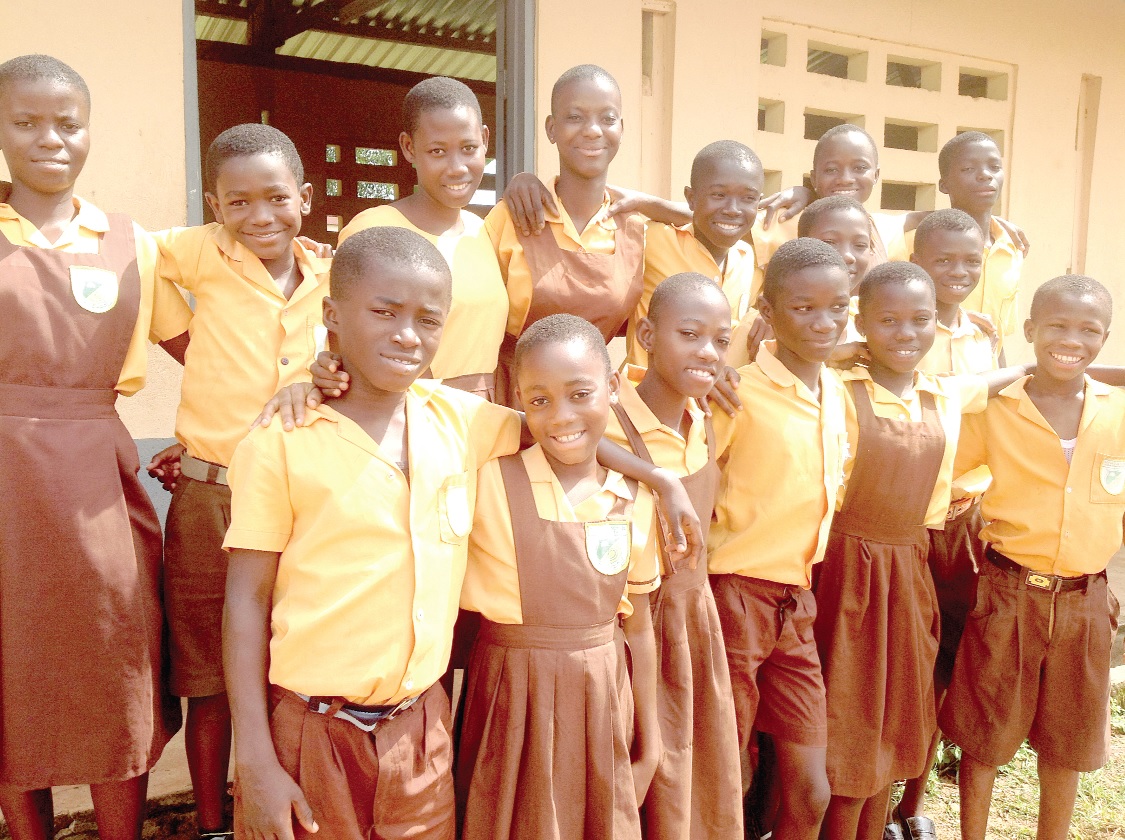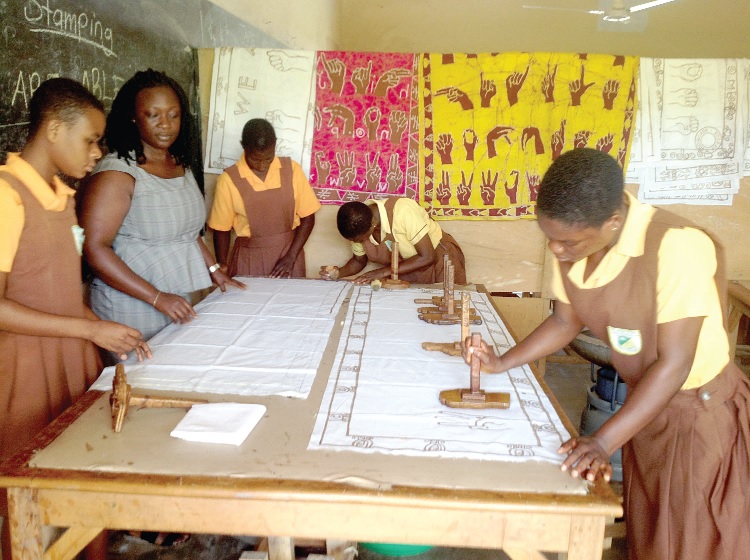Blackouts take away our rights to communicate -Hearing-impaired pupils
 Wendy Oforiwaa Adotey is a nine-year-old hearing impaired pupil and she is gradually developing a strong hatred for darkness in her formative years.
Wendy Oforiwaa Adotey is a nine-year-old hearing impaired pupil and she is gradually developing a strong hatred for darkness in her formative years.
Her attitude stems from the persistent power outages her school experiences that are depriving her of communicating easily with her mates most of the evenings.
Wendy, a primary four pupil at the Koforidua School for the Deaf, uses her sight and hands to express her feelings and thoughts to her friends, which are the basis of sign language.
“Anytime we have blackout, I cannot communicate with my friends and do not see what they try to tell me with their hands,” the brilliant little girl, who can partially hear and speak good English, stated.
She added: “If something bad is happening to me or any of my friends in our dormitory, there is no way we can draw each other’s attention to seek help in the dark”.
“I always have to open my eyes wide in order to see and understand the signs of my friends during blackouts,” she recounted.
The inability of Wendy to express freely herself in the dark at her school is not peculiar to her but a number of multiple handicapped pupils with deafness and low vision.
Diana Okine, a 13-year-old deaf pupil, stated that she always had to ask her peers to repeat the sign gestures they made just to help her understand them, even at close range.
“I am growing to hate light outs as I cannot do my school homework and I have to go to bed early in our warm dormitory and I sweat a lot,” she added.
A JHS two student of the school, Mercy Amoah, 19, recounted that just last Monday, she was unable to do her English, Science and Mathematics assignments and was cautioned by her teacher the following day.
The sentiments expressed by Wendy, Diana and Mercy were interpreted and confirmed by their class teachers, Mrs Mercy Gbeku, Messrs Benjamin Bekoe and Richard Doku, two male partially deaf teachers, who would often say “it is pathetic we cannot be of much help to our children in times of darkness”.
Worriedly, most of the hearing-impaired pupils of the school have what their teachers call multiple handicap — a combination of deafness and low vision, a situation that they claimed aggravated their rights to enjoy normal life during blackouts.
“Anytime we experience lights out, our children, most of whom also have poor vision, refuse to play around and when they do they mostly end up injuring themselves,” Mr Gbeku said.
The persistent power outages at the special school seem to be making life quite uncomfortable for the poor children whose rights to communicate freely among themselves and to their teachers appear to be curtailed during blackouts.
“It is common for those with low vision to run to each other at the dormitories and on campus when we have blackouts,” expressed Mr Bekoe, a Religious and Moral Education tutor.
“It is pathetic that if something is happening to any of these children, there is no way they can draw the attention of their peers or teachers,” added the special teacher.
In the view of Mr Doku, an alumnus, who now teaches Science and Mathematics at the school, the frequent light outs at the school was severely affecting the academic performance of the children.
“Actually, our final-year students who wrote the just-ended BECE needed to revise and prepare for the next day papers but they had no option but to go to bed most of the times and wake up the next day to study,” he said.
Why frequent blackouts?
The non-payment of subvention that caters for administrative functions and feeding, over the past months, is having a serious impact on the school which is indebted to the Ghana Water Company to the tune of about GH¢9,000.
Like the other 33 special schools across the country, the financially-induced challenges have become a major drawback to the academic performance of the pupils and students, as well as their upkeep and the school’s administrative functions.
For instance, during the first term of the 2012/2013 academic year, the school received its subvention in the 12th week of the term, three weeks away from holidays.
“The school had the subvention by the ninth week of the second term just when we were left with six weeks for vacation,” the Headmaster of the school, Mr Ofosu Boachie, stated.
He indicated that though in the eighth week of the current term, no subvention had been received to run the school.
The institution was supposed to have received a 12-month administration grant for the entire 2012 financial year but a grant covering only four months was made available to the school in November last year.
“Since the last grant we had in November, we have just received three months’ grants, covering January, February and March,” the headmaster confirmed to the Daily Graphic.
That implies that the eight months of last year’s grant cannot be given to the school since the year has elapsed, according to Ministry of Finance and Economic Planning policy.
Problem worsened by commercial prepaid meters
The delayed payment of the subvention has placed enormous pressure on the school. It currently pays huge electricity bills, aggravating its financial predicament.
Presently, the school has six commercially-rated prepaid meters located at its classrooms, dormitories and administration blocks.
“Every GH¢50 worth of power we buy is consumed, on the average, in only eight days because our meters are commercially rated”, Mr Boachie complained.
“What do we sell or buy as a special school?” the headmaster queried.
The meters were installed on the school premises following the government’s directive in June 2009 that prepaid meters be installed at all state-assisted schools.
“At weekends, the children cannot watch educative programmes and this has been the bane of our progress for years,” Mr Boachie said.
Surviving on benevolence of teachers
As a government institution, the special school is barred from borrowing funds from the banks and other financial institutions to ensure its smooth running.
The headmaster told the Daily Graphic that he had on many occasions used his own resources to facilitate the feeding of the children at the school.
On days that he had no money, Mr Boachie stated that he had to fall on some generous teachers to assist to feed the children.
The school
The institution, set up in 1975 as the Unit School for the Deaf, was initially an integral part of the New Juaben Primary School and the Sarkodie M/A JHS until 2000 when agitation from teachers at the mainstream school and parents of the hearing children called for a separation.
The separation was started with the primary level but the JHS students remained part of the mainstream schools until 2005, when infrastructure for the school for the deaf began to improve and became the Koforidua School for the Deaf.
The school trains two different groups of handicapped children—those with hearing impairment and the intellectually disabled.
While those with hearing impairment undergo the normal basic education from the kindergarten to JHS, the intellectually disabled are taught basic life skills and some level of numeracy and literacy.
Today, the school has a population of 169 made up of 92 boys and 77 girls.
Academically, the school has been performing creditably.
“In 2011, we had 87.5 per cent passes in BECE and 57 per cent just last year,” Mr Boachie stated.
Improved infrastructure
Regardless of its numerous urgent financial needs, visiting the institution for the first time would strike an awesome impression on anyone as the school is endowed with lush vegetation, as well as some of the finest GETFund projects.
The projects, a 12-unit two-storey block providing spaces for classrooms and administration, as well as an eight-unit three-storey bungalow occupied by eight teachers and their families, were awarded in 2006 and 2007 respectively.
The teachers’ bungalow was handed over to the school in November 2012, a move the headmaster described as a “great relief from the acute accommodation problem”.
“Today, the supervision of pupils is highly enhanced as a result of the teachers’ flats,” he stated,
‘Until the completion of the structure, all teachers, except the headteacher, stayed outside the school and that did not augur well for the supervision of the pupils, especially during prep time,” said Mr Boachie.
The headmaster, however, appealed for funds to enable the school to put up an ICT and vocational centres to enhance teaching and learning.
Transportation
The school appears not to have much problems with transportation as it has at its disposal three vehicles—a 28-seater Mitsubishi Rosa bus donated by the VALCO Fund; a Ford pickup and a 28-seater Eicher bus provided by the government in 2012.
However, the lack of funds for running and maintaining the school bus, is posing a setback.
“We do not really have any problem with transportation but our ability to buy fuel and maintain the vehicles is a significant challenge we face daily,” Mr Boachie said.
Appeal for support
Though the government has made available administrative grants for three months, there is a deep sense of fear that the remaining grants covering the rest of 2013 might not come.
Mr Boachie appealed to the government, corporate bodies and non-profit organisations to aid the school to meet its numerous needs.
“We will be highly grateful if the institution could be supported with a generator to enable us to overcome the frequent blackouts we experience,” he added.
By Nana Konadu Agyeman/Ghana
